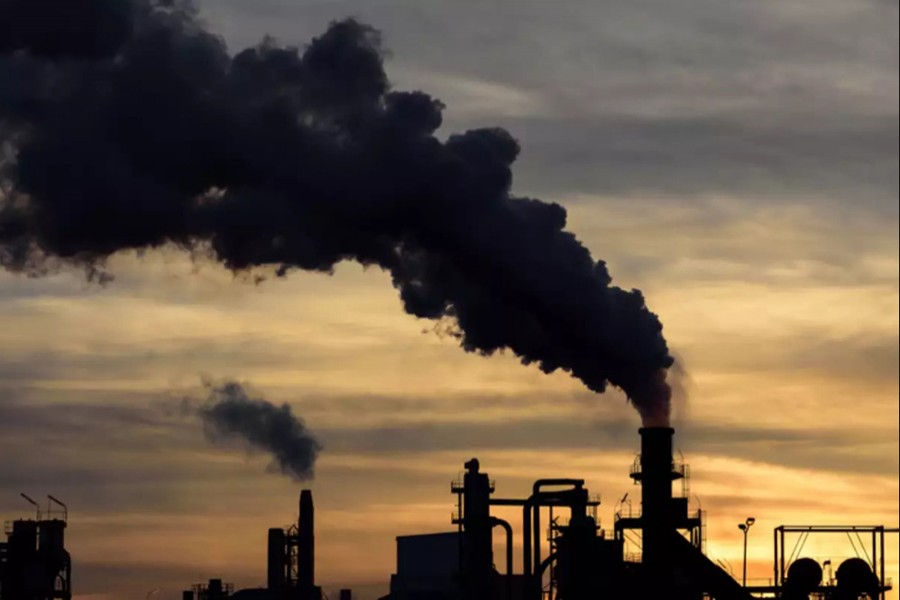Chattogram division, where almost two-thirds of the fossil fuel projects have been proposed, is at high risk of being one of the world’s largest carbon catastrophes, said a new report.
The report released by Market Forces, Bangladesh Poribesh Andolon (BAPA), and Waterkeepers Bangladesh on Monday reveals dramatic fossil fuel growth could release 1.38 billion tonnes of carbon dioxide equivalent (CO2-e) into the atmosphere throughout the plants’ operational lifetime.
This massive expansion of fossil fuel plants would be predominantly built or financed by foreign companies from Japan and the United States.
Matarbari 2, a1, 200-megawatt (MW) coal power plant planned by Japanese businesses, is arguably the most destructive proposal. If built, the health effects of air pollution from the Matarbari 1 and 2 projects would result in an estimated 6,700 premature deaths throughout their operational years. This project also contradicts Japan's 2021 G7 commitment to halt overseas coal financing.
Key Chattogram players, Mitsubishi Corporation (Mitsubishi), JERA’s owners TEPCO and Chubu, as well as SMBC Group, are all facing demands from investors in the coming weeks seeking disclosure about the compatibility of these types of carbon-intensive projects with their net-zero pledges.
The report - A Carbon Catastrophe in the Making: The Dirty Energy Plans in Chattogram - highlights the adverse impacts of the proposed 20 gigawatts (GW) of new coal and gas power capacity in thee district.
The report predicts the massive construction projects will have disastrous consequences for the local ecology and waterways, communities and livelihoods, health, as well as the climate.
The report forecasts by 2030, subsequent LNG-to-power projects are estimated to cost an average of US$960 million per GW, reaching close to US$18 billion for Chattogram alone, which is six times more than Bangladesh's 2022 budget to mitigate the adverse effects of climate change.
Furthermore, Bangladesh already has a significant overcapacity problem. Around 60 per cent of installed capacity was not used in 2020-2021.
The gap between power production capacity and actual demand has gradually increased over the previous few years, according to the Institute for Energy Economics and Financial Analysis (IEEFA), with capacity utilisation projected to drop below 40 per cent in the next five years as more capacity is installed.
Climate science and energy economists have made it clear: if we are serious about averting the climate catastrophe, we need to stop building new coal, gas, and oil projects.
“Companies from Japan and the United States should stop treating Bangladesh as one of the last dumping grounds for polluting power technology and instead help it meet its new power needs with clean, affordable, and climate-friendly technologies,” said Julien Vincent, Market Forces executive director, an environmental finance NGO focused on fossil fuel projects in Asia and Australia.
Companies such as Mitsubishi, JERA, and General Electric (GE) are pushing for these projects so that they can profit from the expansion of toxic power plants, with little regard for the cost to Bangladesh and Bangladeshis, said Sharif Jamil, general secretary of BAPA.
“Investors in these companies need to be aware: Bangladeshis want investment in clean, cost-effective energy, not polluting, expensive LNG,” he said.
Bangladesh's government paid US$1.6 billion to companies for underutilised power capacity in 2021. Due to low demand and delays in construction of transmission infrastructure, the newly completed Payra coal power plant, for example, had not functioned at full capacity for months. From the start of its commercial operation until June 2021, the owners received around US$116 million (Taka 10 billion) for sitting idle.
Indeed, the Bangladesh Power Development Board (BPDB) is calling for pricing hikes to offset the crippling expenses of buying power from independent power producers, shifting the financial burden of Bangladesh’s overcapacity crisis to electricity users.
According to IEEFA, Bangladesh's economy would be exposed to a volatile price market from imported fuels. If these projects proceed, the Bangladeshi public would be forced to face financial risks that should have been borne by foreign private enterprises.
"Sumitomo Corporation, a Japanese conglomerate, withdrew from the Matarbari 2 coal plant. Japanese private banks and investors are strengthening their climate policies dramatically. Coal and gas projects will not be financeable soon, even if by Japanese investors," said Yuki Tanabe, programme director, Japan Center for a Sustainable Environment and Society (JACSES)


